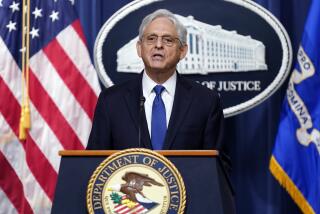This Time, Backers Glad Bush Yielded
- Share via
WASHINGTON — President Bush is famous for digging in his heels when the powers of his office could be compromised, a trait that supporters cite as evidence of his strong leadership.
But some of his most loyal supporters -- Republicans in Congress -- were relieved Tuesday when Bush gave in on what he had once said was a legal and constitutional principle of the highest order.
By allowing his national security advisor to testify in public and under oath before the commission investigating the Sept. 11, 2001, terrorist attacks, they said, Bush had finally addressed a growing political liability.
For Republicans who feared political fallout from the protracted struggle, the only question was: What took him so long?
Bush risked looking like an enemy of openness in the investigation, due to his insistence on invoking his legal power to block Condoleezza Rice’s testimony, some Republicans said. “They had a blind eye to the political implications of what they were doing,” said Rep. Christopher Shays (R-Conn.). “Lawyers have a way of keeping you out of jail, but making you look guilty.”
The controversy tapped into a signature feature of Bush’s leadership style: He tends to stick to his guns on core issues even beyond the point where other Republicans would cave.
“You could make a case that one of Bush’s greatest strengths, which is resolve in leadership, can also be a weakness at times: My way or the highway,” said a Republican strategist who works with the White House.
The controversy fueled frustration among Republicans in Congress, who have been whipsawed before by the White House’s stubborn refusal to give ground on politically sensitive issues.
For example, Bush fought creation of the Department of Homeland Security for months before embracing the idea, which had almost unstoppable momentum after the attacks on New York and the Pentagon. He opposed creation of the independent Sept. 11 commission in the first place, then endorsed the idea when its passage seemed inevitable.
Those episodes generated some resentment among Republicans in Congress, who felt the White House had pulled the rug out from under them after they had defended Bush’s unpopular positions.
Indeed, less than 24 hours before announcing the decision to have Rice testify, the White House was still asking GOP leaders to go to bat for the president.
A senior Senate Republican aide said lawmakers were puzzled by the administration’s failure to grasp the mood of a public that has little patience for any perception of stonewalling on subjects related to Sept. 11.
The administration “thought it could tell the American public that 9/11 wasn’t important enough to send an advisor up to talk?” the aide said. “Are you kidding me?” The flap was particularly unwelcome in the wake of accusations by former White House counterterrorism advisor Richard Clarke that the Bush White House was too complacent about terrorism before the attacks that killed nearly 3,000.
Restiveness among Republicans in Congress added to the pressure on the White House to reverse course. Senate Majority Leader Bill Frist (R-Tenn.) took soundings from his colleagues and sent a clear message to the White House, according to a senior aide: “Principle be damned. Change your principles.”
Frist and House Speaker J. Dennis Hastert (R-Ill.) hashed it over with White House aides Monday night. Frist warned the White House that Senate Democrats planned a major offensive Tuesday, forcing a vote on a measure calling on Rice to testify. That vote would have put Republicans in the position of having to formally record their support for the president’s position.
Then Republican leaders in Congress sealed the deal with the administration by stipulating in writing that Rice’s testimony would not, as administration lawyers had feared, set a precedent for future White House officials to be called before Congress.
Among other reasons, Bush had wanted to block Rice’s testimony because it ran afoul of his effort, strongly backed by Vice President Dick Cheney, to restore and build powers of the executive branch that he believes have eroded in the last generation. Administration officials said it was their institutional responsibility to defend the principle of executive privilege, the legal notion that the president’s staff reports directly to him and is not required to answer summonses from Congress.
Bush allies hoped Tuesday’s reversal would clear the way for the administration to regain the upper hand in debate about its anti-terror policy and to more effectively challenge Clarke’s accusations. By blocking Rice’s testimony for so long, Republicans said, the administration had undercut one of its most forceful spokespersons.
“The White House underestimated the damage that preventing Rice from testifying would cause them,” said Sen. Susan Collins (R-Maine). “They shot themselves in the foot.”
Times staff writers Mary Curtius and Greg Miller contributed to this report.
More to Read
Sign up for Essential California
The most important California stories and recommendations in your inbox every morning.
You may occasionally receive promotional content from the Los Angeles Times.













